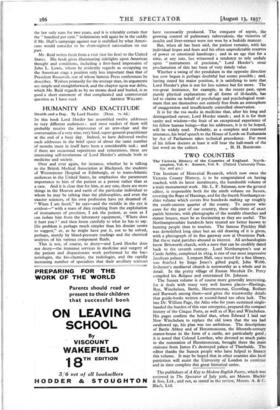HUMANITY AND EXACTITUDE
Health and a Day. By Lord Horder. (Dent. 7s. 6d.)
IN this book Lord Horder has assembled twelve addresses to very different audiences ; and most readers of them will probably receive the impression of an arm-chair and the conversation of a very wise, very kind, super-general-practitioner at the end of a busy day. Indeed, to have delivered twelve such addresses in the brief space of about the same number of months must in itself have been a considerable task ; and if there are occasional repetitions and reiterations, these are interesting self-revelations of Lord Horder's attitude both to medicine and society.
Over and over again, for instance, whether he is talking to the British Medical Association at Blackpool, the students of Westminster Hospital or Edinburgh, or to trans-Atlantic audiences in the United States, he emphasises the paramount importance to him of the patient as a person rather than as a case. And it is clear that for him, at any rate, there are more things in the Heaven and earth of the particular individual to whom he may be talking than the philosophies, and even the exacter sciences, of his own profession have yet dreamed of. " When I am faced," he says—and the twinkle in the eye is evident—" with a mass of data resulting from the exploitation of instruments of precision, I ask the patient, as soon as I can isolate him from the laboratory equipment, ' Where does it hurt you ? ' and then listen carefully to what he has to say. His problem is perhaps much simpler than his dossier seems to suggest," or, as he might have put it, not to be solved, perhaps, merely by blood-pressure readings and the chemical analyses of his various component fluids.
This is not, of course, to decry—and Lord Horder does not decry—the immense services to medicine and surgery of the patient and dispassionate work performed by the bac- teriologist, the bio-chemist, the radiologist, and the rapidly increasing number of specialists that their ancillary sciences have necessarily produced. The conquest of sepsis, the growing control of pulmonary tuberculosis, the victories of insulin and liver-extract were not won by a bedside manner.
But, when all has been said, the patient remains, with his individual hopes and fears and his often unpredictable reserves of power or emotional handicaps ; and in an age that for a time, at any rate, has witnessed a tendency to rely unduly upon " instruments of precision," Lord Horder's stout proclamation of this has been of very timely value.
Whether a swing of the pendulum in the opposite direction has now begun is perhaps doubtful but seems possible ; and, having stated his major position, it is satisfying to note that Lord Horder's plea is not for less science but for more. The too-great insistence, for example, in the recent past, upon purely physical explanations of all forms of ill-health, has led to claims on behalf of psychology and psychological treat- ment that are themselves not entirely free from an atmosphere of exaggeration and insufficiently controlled observation.
It is for the via media in medicine that, after his long and distinguished career, Lord Horder stands ; and it is for their sanity and wisdom—the fruit of an exceptional experience of his fellow human beings—that his addresses, it is to be hoped, will be widely read. Probably, as a complete and reasoned utterance, his brief speech to the House of Lords on Euthanasia by Act of Parliament takes technical precedence. For most of his fellow doctors at least it will bear the hall-mark of the






































 Previous page
Previous page